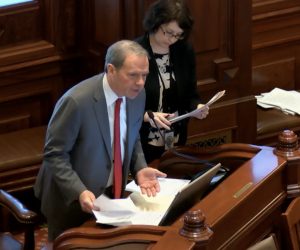State Senate rejects idea for religious registry
By Kevin Beese Staff reporter — May 14, 2018
State Senate President John Cullerton (D-Chicago) talks about the need for Illinois to send a message to Washington about a proposed religious registry. His legislation stating that Illinois would not participate in any registry passed the Senate unanimously last week. (BlueRoomStream.com)
No religious registry will take place in Illinois, if state senators get their way.
State senators last week unanimously passed legislation opposing the federal government’s creation of a database to track people by their religion.
Senate President John Cullerton (D-Chicago) said the legislation sends a message to the White House and Washington that the Land of Lincoln won’t be part of such narrow-minded politics.
“With this, Illinois sends a message. The government forcing people to register their religion is fundamentally un-American,” said Cullerton, the lead sponsor of the legislation opposing religious registries. “It conjures up ugly imagery of the past that should never be repeated.”
Cullerton said his proposal came in response to anti-Muslim rhetoric from then-candidate and now-President Donald Trump. The senate president noted that the legislation simply states that Illinois would not participate in any database or registry of faith followers.
The proposal passed the Senate last week in a 39-0 vote. Two Republican senators, Pam Altoff of McHenry and Jim Oberweis of Sugar Grove, voted “present” on the matter.
The legislation now advances for consideration in the Illinois House.
The bill creates the Anti-Registry Program Act that says no state worker or agency will use state money, facilities, property, equipment or personnel to participate in or support the creation, publication or maintenance of a registry program. The bill also restricts any state worker or agency from disclosing any individual’s demographic information for creation of a registry or to require registration in a registry.
The bill had to be altered from its original form, Cullerton said, as it initially would have prevented the Illinois Department of Revenue from collecting demographic information on tax forms. Secretary of State Jesse White and law enforcement groups also expressed concerns that the legislation’s original language would have restricted information being collected and maintained in police databases.
Amendments were added to the bill to address those concerns.
“We can say that this legislation is not intended to limit the use of existing law enforcement databases that are used for nondiscriminatory purposes,” Cullerton said on the Senate floor Thursday.
Despite registry talk dying down in Washington, he said the bill is still a needed piece of legislation.
“During the last presidential campaign, there was a lot of talk about registries. It is of great concern to many minority groups in the state of Illinois,” Cullerton said. “It is a very important statement.”
State Sen. Dale Righter (R-Mattoon) said keeping Big Brother out of people’s information is always a good step.
“The less privacy people have, the larger government gets, the more registries and lists people maintain,” Righter said.
Cullerton noted that all state databases currently in existence would be allowed to continue, should the legislation become law.
The Senate president said with the talk of a Muslim registry during the 2016 campaign there was a 600 percent increase in hate crimes against Muslims.
“The original purpose of the bill was to say ‘We are not going to allow any registries,’” Cullerton said
—- State Senate rejects idea for religious registry —-







